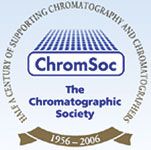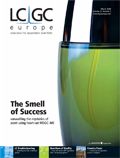Chromatographic Society Spring 2008 Meeting
The meeting, being held 21–22 May, will review the latest developments in stationary phase technologies for liquid chromatography. It will also include lectures on emerging stationary phase chemistries, specialised functional phases and small particle size packings The event will be of interest to all practitioners of separation science, but in particular those using liquid chromatography for problem solving and method development.
MAY 2008
The Chromatographic Society Spring 2008 Meeting and AGM Reading, UK
The meeting, being held 21–22 May, will review the latest developments in stationary phase technologies for liquid chromatography. It will also include lectures on emerging stationary phase chemistries, specialised functional phases and small particle size packings

The event will be of interest to all practitioners of separation science, but in particular those using liquid chromatography for problem solving and method development.
Day One highlights include Session One titled Current state-of–the art and the future, Keynote Lecture One: Overview of current technology and future with Dr Ron Majors (Agilent); Keynote Lecture Two: Pillar arrays with Dr Gert Desmet (Brussels Free University); Lecture One: Column classification? with Prof. Mel Euerby (Hichrom) and Lecture Two: Molecular mechanism of HPLC retention and column classification in view of QSRR with Prof. Roman Kaliszan (University of Gdansk, Poland).
Day Two highlights include Session Three titled Industrial perspectives, Lecture Three: Real benefits of sub 2 micron particles with Dr Roman Szucs (Pfizer); Lecture Four: Ultra-fast gradients with Ian Mutton (GSK); Lecture Five: Stationary phase selectivity in preparative chiral SFC with Dr Mary Luz de la Puente (Lilly); Session Four titled Novel supports and stationary phases, Lecture Six: Alternative stationary phase supports with Prof. Peter Myers (University of Liverpool); Lecture Seven: Thermally responsive polymers with Dr Frederic Lynen (University of Ghent); Lecture Eight: Molecularly Imprinted Polymers with Dr Richard Ansell (Leeds University) and Lecture Nine: Monoliths for small molecule separations with Dr Zhengjin Jiang (Novartis).
For more information visit the website www.chromsoc.com or contact Steve Rumbelow s.rumbelow@earthlink.net or Ted Adlard tedadlard@gaschrom.demon.co.uk
April 2008
Analytica 2008, Munich, Germany
From 1–4 April 2008, Munich will once again be the stage for Analytica 2008 — a leading trade fair offering marketable solutions in analytics, laboratory technology, biotechnology and the life sciences.
Since 1968 Analytica has been held every two years and has become an established international meeting point for leaders in the laboratory industry. It is also recognised for being a communication and business event for the international community, offering the presentation of innovative products and services and of the reproduction of entire value-added chains in industrial and research laboratory applications.
Analytica 2008, which will be held at Fairground, Munich, will feature international events to help build business relationships on a global scale. These will include the Analytica Forum, which is a platform for the exchange of information and transfer of knowledge, and the European international research community summit.
For more information about Analytica 2008 contact Messe München GmbH, Messegelände, 81823 Munchen, Germany, tel: +44 89 949 11488, fax: +44 89 949 11489 or e-mail: info@analytica.de
EVENT NEWS
10–16 May 2008
32nd International Symposium on High Performance Liquid Phase Separations and Related Techniques Baltimore Marriott Waterfront Hotel, Baltimore, Maryland, USA Contact: Ms Janet Cunningham, symposium/exhibit manager e-mail: janetbarr@aol.com
20–23 May 2008
HET Instrument 2008 — Analysis; Biotechnology; Laboratory Equipment Jaarbeurs Utrecht, Netherlands Organizer: FHI Federation of Technology Branches Contact: Ms Petra Bronsema tel: +31 33 465 75 07 fax: +31 33 461 66 38 e-mail: p.bronsema@fhi.nl
3–6 June 2008
Forum LABO — Forum BIOTECH Porte de Versaille, Paris, France Organizer: Committee Interprofessional of Laboratory Suppliers (CIFL), 28, rue St Dominique, 75341 Paris, France Contact: Ms Christiane Turci tel: +33 1 441898 62 fax: +33 1 441898 63 web: http://www.cifl.com/
20–22 October 2008
LABTECH Conference & Exhibition 2008 The Gulf International Convention and Exhibition Centre, PO Box 580, Kingdom of Bahrain, Manama, Bahrain Organizers: Saudi Aramco Co, ACS, SAICSC-ACS and Bahrain Society of Chemists Contact: Yaser Sonbul, Saudi Aramco Co. Box# 7010, N/A Ras Tanura, 31311, Saudi Arabia e-mail: vaser.sonbul@aramco.com
12–14 December 2008
10th European Meeting on Supercritical Fluids — Reactions, Materials and Natural Products Processing Congress Centre, Strasbourg, France Organizers: ISASF-ENSIC Contact: F Brionne, 1 Rue Grandeville, B.P. 45 I, Nancy, Cedex, F-54001, France tel: +33 3 83 17 50 03 fax: +33 3 83 35 08 11 e-mail: brionne@ensic.inpl-nancy.fr
Send your event details to cbuckett@advanstar.com

New TRC Facility Accelerates Innovation and Delivery
April 25th 2025We’ve expanded our capabilities with a state-of-the-art, 200,000 sq ft TRC facility in Toronto, completed in 2024 and staffed by over 100 PhD- and MSc-level scientists. This investment enables the development of more innovative compounds, a broader catalogue and custom offering, and streamlined operations for faster delivery. • Our extensive range of over 100,000 high-quality research chemicals—including APIs, metabolites, and impurities in both native and stable isotope-labelled forms—provides essential tools for uncovering molecular disease mechanisms and exploring new opportunities for therapeutic intervention.
New Guide: Characterising Impurity Standards – What Defines “Good Enough?”
April 25th 2025Impurity reference standards (IRSs) are essential for accurately identifying and quantifying impurities in pharmaceutical development and manufacturing. Yet, with limited regulatory guidance on how much characterisation is truly required for different applications, selecting the right standard can be challenging. To help, LGC has developed a new interactive multimedia guide, packed with expert insights to support your decision-making and give you greater confidence when choosing the right IRS for your specific needs.

.png&w=3840&q=75)

.png&w=3840&q=75)



.png&w=3840&q=75)



.png&w=3840&q=75)










